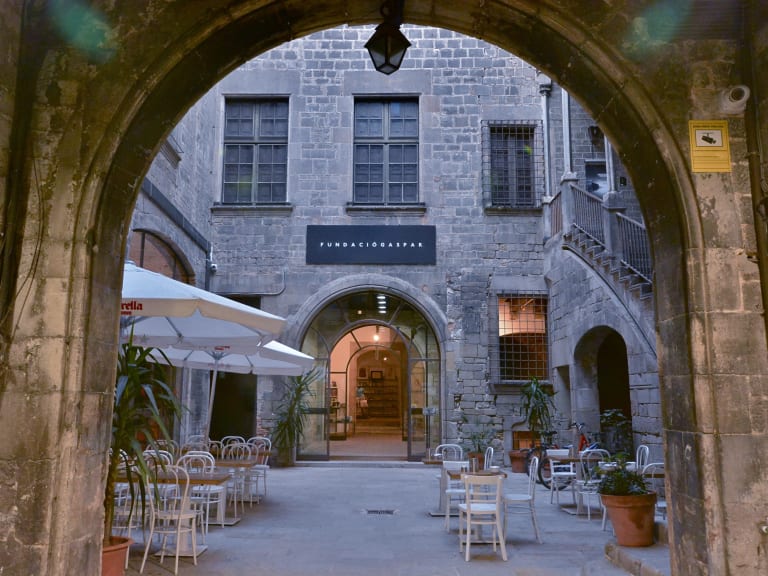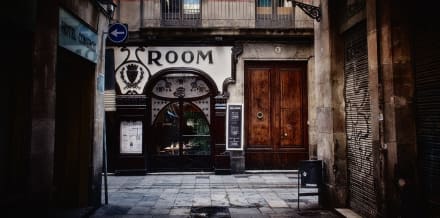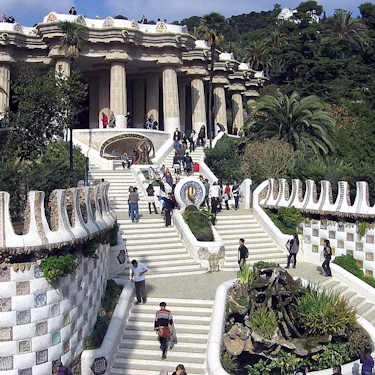More about: 6 Best Barcelona Gothic Quarter Tours
The Gothic Quarter is the original nucleus of the Catalan capital. Its origins date back to the time of Barcino, the Roman colony built during the reign of Emperor Augustus. The medieval architecture and narrow streets form an urban fabric that has witnessed thousands of historical events.
Among Barcelona's many attractions, the Gothic Quarter deserves a special mention. Not in every city can you appreciate the contrast between medieval architecture and contemporary bars and shops.
Stories and legends of the Gothic Quarter

Walking through the Gothic Quarter is like taking a trip back in time. Its stone buildings and narrow streets form a real labyrinth and only a local guide can reveal the secrets hidden behind every wall. There are different tours and in most cases they include the following stages:
- Plaça Nova, the heart of Roman Barcelona. This area preserves some buildings from the period - two towers and what remains of an aqueduct - as well as the Casa de l'Ardiaca, the former residence of the ecclesiastical hierarchy. A few metres further on stands the Cathedral of Santa Eulàlia. During the Christmas season this urban space hosts a traditional Christmas market.
- Basilica of Santa Maria del Mar, the gem of Catalan Gothic architecture. It was built in the 14th century, the golden age of the Crown of Aragon. It is "The Cathedral of the Sea" described by Ildefonso Falcones.
- Plaça del Rei, a very charming corner. It was the centre of power in the Middle Ages and its main attraction is the Palau Reial Major, the old residence of the Catalan Counts.
- Carrer de Montcada, the main axis of the Middle Ages. Here you will find the Picasso Museum, an art collection in the evocative Palau Aguilar.
- Plaça de Sant Just i Pastor and its church of the same name, the oldest in the city.
Normally, to liven up the tour, a stop at a bar is included. The cost of the experience includes a pincho and a drink (beer, glass of wine or soft drink). Everything else is at your own expense.
- Duration: between 2 and 3 hours
- Cost: between 20 € and 30 €.
Tapas tasting in the Gothic Quarter

This medieval quarter is home to some of Barcelona's best wine cellars. Carrer de la Mercè - a street that runs parallel to Passeig de Colom - is a traditional destination, but it is not the only one. This area is a labyrinth of narrow streets that hide quality bars and restaurants.
For a gastronomic tour of Barcelona it is best to hire a guided tour. There are several options that go around the Gothic Quarter and stop at four or five establishments. In addition to the food, at each stop you can enjoy a beer or a glass of wine, vermouth or cava.
These experiences take place both in the afternoon and at midday and will give you the chance to eat fish, cold meats, padrón peppers and the bomba, Barcelona's most famous tapa. This is a potato croquette stuffed with meat that will win you over with its crunchy texture on the outside and juicy inside.
- Duration: more or less 3 hours
- Cost: between 80 € and 120 €.
Ghost tour in the old town

Travelling to the Catalan capital for Halloween? Then you can top off your visit with a ghost tour. Like other cities in Spain, Barcelona is also home to some lost souls and some claim that the Devil himself has wandered its streets.
The tour takes in different parts of the city, including the Gothic Quarter, and is the perfect way to discover a different side to local history. In some cases, these experiences are inspired by "Ghosts of Barcelona", a book by journalist Sylvia Lagarda Mata. In other cases, the route is designed as a series of riddles that make the route even more entertaining.
To solve the mysteries and continue along the route, all you need is your smartphone. You don't even need an internet connection, as the puzzles can also be solved offline.
- Duration: between 1 and 2 hours
- Cost: between 5 € and 10 €.
Tour of El Call, the old Jewish Quarter

In the Middle Ages Barcelona was home to the largest and most prosperous Jewish community in Spain. In Catalonia, the Jewish quarters were called "Calls" and the one in the capital was located in the heart of the Gothic Quarter. Nowadays it would be framed between the streets of Banys Nous, Sant Sever, Bisbe and Call and in the surroundings of the Church of Sant Jaume.
The guide will illustrate the history of the neighbourhood and its people who lived here until 1492 when the Catholic Monarchs expelled the Jews from all their possessions. Their traces survive to this day and the main one is the Main Synagogue. It stands on the foundations of a Roman building and is one of the oldest in Europe. These routes usually include entry to the Museu D'historia de Barcelona de El Call. It was opened in 2015 to show the life of the Jewish community during medieval times.
- Duration: between 1 and 2 hours
- Cost: approximately €50
Photo Experience in Barcelona

Barcelona is wonderful and has some lovely spots. The Boqueria Market, the Tibidabo Ferris wheel or Park Güell are a magnet for cameras and yet there are "instagrammable" places in every part of the city, including the Gothic Quarter.
This tour will take you to the most evocative spots in medieval Barcelona. Below is a snack of the most beautiful spots:
- Carrer del Bisbe, a pedestrian street that connects Plaça Sant Jaume and the Cathedral. Its main attraction is the Pont del Bisbe, an elevated walkway reminiscent of the Bridge of Sighs in Venice. Despite its Gothic style, it was built in the 1920s.
- Palau de Lloctinent, the former residence of the viceroys (at least in the initial intentions). In fact, it is known for having been the headquarters of the Inquisition in Barcelona.
- Carrer de la Pietat, where time seems to have stood still. It runs behind the Cathedral and when you look up you will see gargoyles and colourful rose windows.
You'll be accompanied at all times by an expert photographer who will help you take the perfect snapshots. Please note that these tours don't only take place in the Gothic Quarter, but also usually include the Born, the Vila Olímpica and the Eixample.
- Duration: between 1 and 2 hours
- Cost: between 50 € and 60 €.
Tour of the Gothic Quarter with entrance to the Picasso Museum

This option combines a guided tour of the district with admission to the museum dedicated to the Malaga painter. In the first part, the route takes in the district's most outstanding monuments: the Gothic churches of Santa Maria del Pi and Santa Maria del Mar, Carrer Montcada and its palaces, the Cathedral and the Palau de la Música Catalana, the modernist auditorium designed by the Barcelona architect Lluís Domènech i Montaner.
In the second part you will enter the Picasso Museum, one of the best in the city.
The painter lived in Barcelona in his younger years and many works from this period are still in the city. Among the most outstanding are "The Divan", "Man in a Beret" and "The Embrace".
- Duration: between 3 and 4 hours
- Cost: between 150 € and 200 €.
Where to eat in Barcelona's Gothic Quarter?

After a long walk you need to get your strength back. Luckily, this part of the city is home to a host of bars and restaurants specialising in both local and foreign cuisine. For a break I recommend the following establishments:
- Antic Teatre, a cultural centre that hides one of the most suggestive terraces in the whole city (Carrer Verdaguer i Callís 12).
- Can Cullerets, a traditional restaurant between Las Ramblas and the Church of Sant Jaume. It is said to be the oldest in Barcelona. Beware, it is only open for dinner from Thursday to Sunday (Carrer Quintana 5).
- Arcano, an establishment specialising in market cuisine. If you're travelling with your partner, it's a sure hit: it's housed in a former 17th-century stable and has delicious desserts (Carrer dels Mercaders 10).
- La Plata, another traditional option just a stone's throw from Passeig de Colom (Carrer de la Mercè 28).
- Bistrot Levante, a Mediterranean restaurant with a nod to Middle Eastern cuisine. Its recipes are tasty and healthy at the same time (Placeta de Manuel Ribé 1).














